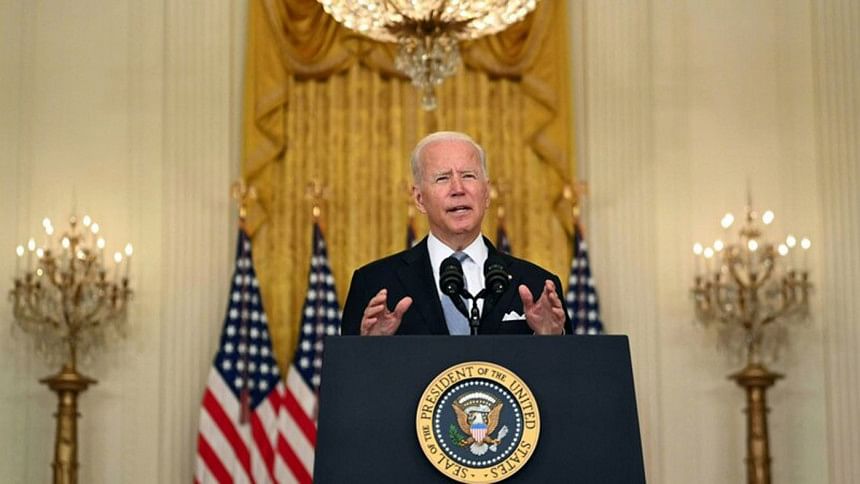Afghanistan, Taliban and the United States

Full US troop withdrawal from Afghanistan was announced by President Joe Biden on April 14, 2021. It raised eyebrows but did not ruffle public feathers. The sudden and complete mid-August pull-out did. Desperate Afghanis running to cling on to a military transport plane taking off exposed how pathetic the plight was.
Two such war-related photos once shook the world and left some lessons. The first photo, no less of an Afghani, portrayed Sharbat Gula, a captivating green-eyed Pashtun girl driven by Soviet troops into Pakistan's Nasir Bagh refugee camp, the second of "napalm girl," Phan Thi Kim Phuc, a naked 9-year-old with a burned back screaming as she fled Viet Cong bombings in 1972. Whereas the former graced the June 1985 National Geographic cover and the latter won a photography Pulitzer Prize, some such accolade surely awaits this month's Kabul escapade.
Germany's sedate Chancellor, Angela Merkel, called this rushed exit a "mistake"; whispering UK willows alluded to it as "the biggest foreign policy disaster since Suez" (in 1956); and French President Emmanuel Macron's desire of "strategic autonomy from the United States" strengthened. China saw that exit as US "humiliation" and Russia its consequences as "horror." Both gleefully constructed Taliban deals.
The United States did that too. Stanford historian Robert Crews calls Donald J Trump's March 2020 Taliban deal as the exit "roadmap". "We're dealing very well with the Taliban," spoke Trump on September 18, 2020. "They're very tough, they're very smart, they're very sharp," he continued, "[b]ut, you know, it's been 19 years. . . even they are tired of fighting." His May 2021 exit deadline was stricter than Biden's.
Analysts wonder why this hullabaloo. That exit was being suggested by at least five slow-moving dynamics: (a) the "sinking-in" failure; (b) coffer considerations; as well as (c) changes in domestic priorities of policy-supplying country; (d) neighbourhood climate of the policy-recipient country; and (e) the global context.
Except for "westernising" Kabul and modernising Bagram Airfield (located 40kms north of Hamid Karzai International Airport), US and NATO troops simply could not transplant any "anti-terrorism" mindset among Afghanis, who know more about war than the typical US citizen, after 9/11. Particularly difficult to harness was the countryside. Malleable Loya Jirga representatives and a public largely untutored in 9/11 conversations did not gel with foreign troops, with US troops now, or with Soviet troops in the 1980s. Carrying a 40-year psychological toll of swaying battles, Afghan citizens only rallied to what they knew well: faith (read: Islam), and ethnic identity. Reforms centrally initiated at the centre hardly trickled down, the urban-rural gap widened, and appropriate integrative infrastructures remained pipe-dreams. How Afghan unity was hijacked by mostly Kabul-based mercenaries, gold-diggers, and drug-traffickers exposed why a 300,000-strong army simply collapsed with US departure and after 20 years of training. Staying and defending a marriage is fine, but not a mirage. President Ashraf Ghani's cowardly escape with his loot dramatised the longest US war as being nothing more than a security soap opera.
Though security considerations made development unproductive and costly, behind the military bandwagon numerous academic, business, gender, social, and welfare global groups entered a once-forbidden country, exposing possibilities and opening hitherto closed segments, particularly among women. Negotiating with Taliban in Qatar raised policymakers' hopes, but not vox populi's. Hoof-sounds of the Taliban Trojan Horse were heard loud and clear, far and near.
Once bitten, today's twice shy Taliban has become more worldly, socially savvy, experienced, and youthful enough to go the distance, even if this compromises its own brand of Islam. It can look US negotiators eyeball-to-eyeball and enter cities without blazing guns. Hard-line fall-backs cannot be ruled out, but if "carrots" could convert fearful, fed-up, and uprooted rural dwellers, why turn to "sticks"? Though a smaller Al-Qaeda faction remains a Taliban partner, Imran Khan, the Pakistani leader whose instrument the Taliban is, remains wary of fundamentalism spilling over. Only seething countryside anger pitting Pashtuns, Hazara, Nuristanis, Tadjiks, Turkmenis, and Uzbekis against each other could derail immediate Taliban prospects.
Secondly, "coffer considerations" haunts the United States. When 9/11 happened, the United States concluded its longest 20th century economic expansion (1992-2001). By contrast, the stagnating post 2008-11 Great Recession decade saw healthy global competition turn nastier, long-term jobs displaced by fickle and fluid alternatives, technological shifts from hardware to software becoming institutionalised, spiking migrant flows fuelling populism, and obviously Covid pandemic hammerings. No democratic public can forever fund a lost cause against that backdrop. President Trump made this his election talking-point. President Biden independently followed suit.
Changes undergird the third, fourth, and fifth dynamics portrayed domestic US priorities, Afghanistan's fluctuating neighbourhood pulse, and in-flux global order stakeholders. Envisaged in 2013, the USD 62 billion China-Pakistan Economic Corridor project opened Gwadar Port as China's outlet to the strategic Straits of Hormuz and economically ever-bountiful Africa. India followed suit building Iran's Chabahar Port from 2015 to plant its own Persian Gulf flag and divert Afghanistan from Pakistani ports. Taliban retaking Kabul now puts Pakistan behind the region's steering-wheel, meaning the next move is India's. Two masks must be removed: Pakistan's remodelling Taliban to make it receptive enough for Uyghur-suppressing China; and India's superficial SCO membership, given its friendly Russian stripe, even friendlier US colours.
As relative US global salience diminishes, the China-Russia SCO (Shanghai Cooperative Organisation) influence grows. Often falsely dubbed as "China's NATO," this loose multilateral 2002 construction originated from multilateral 1996-1998 Shanghai Five deals, bonding Kazakhstan, Kirghizstan, and Turkmenistan (and later Uzbekistan). Among new members, India and Pakistan moved from "observer" status to "full membership", with Afghanistan and Iran tip-toeing them. As goals and interests proliferate, this originally soft-power non-US bulwark loosens further.
Reduced US profile where the "great game" was historically played can be seen as globally destabilising, but it has never been a US "game". Alongside Australia, Japan, and the Philippines, the United States sees the South China Sea as its new Alamo. Still, any China-US contestation differs from the Cold War Soviet-US rivalry: its economic premises rather than geopolitical; globally pivotal commercial exchanges between the two protagonists, China and the United States; and looser alliances than the NATO/Warsaw Pact counterparts. All told, the South China Rubicon is all set to displace the "graveyard of empires," that is, Afghanistan, from behind the "global-order" steering-wheel. China's Belt and Road Initiative guaranteed that on land by neutralising Afghanistan's "graveyard" potential, and on sea through a string of artificial islands.
Afghanistan free-riding US economic and security resources generalises the apt "damned-if-I-do, damned-if-I-don't" phrase for the United States, Taliban, and Afghanistan: any policy/decision of anyone will fetch inevitable condemnation from a single, few, or all others, just as not making a policy/decision, will also be finger-pointed on all fronts. When one country or group faces that predicament, a balancing act typically comes from the actions of others; if two countries or groups err similarly, order can still be brought, though the climb becomes more uphill. With all sides similarly oriented, mitigating factors vanish. Anything can happen, even without invoking domestic public considerations, a louder clout today than ever before. Whether it is the US exit, Taliban takeover, or missed Afghani opportunities, the blame-game innings is unlikely to end soon, but that is just what opportunists of all stripes need to thrive. They win because "Rome" slept.
Dr Imtiaz A Hussain, Head, Global Studies & Governance Program, Independent University, Bangladesh. Jessica Tartila Suma, Lecturer, Global Studies & Governance Program, Independent University, Bangladesh.

 For all latest news, follow The Daily Star's Google News channel.
For all latest news, follow The Daily Star's Google News channel. 



Comments